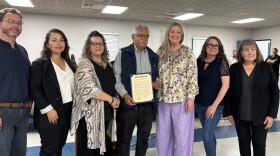When tragedy strikes, survivors are often overwhelmed.
They don’t know what to do. They don’t know who to ask for help.
That’s when people from the nonprofit Trauma Intervention Programs ,or TIP, jump into action.
TIP volunteers are specially trained to provide emotional first aid to people who have experienced a sudden death in the family, or other traumatic event.
Training
On a recent Saturday afternoon at a fire station in Lemon Grove, TIP trainer Malcolm Mitchell laid out some fundamental principals to a group of eight would-be volunteers.
He told the trainees that people who have suffered a tragedy often go into emotional shock. Mitchell talked about the time he was called to help a woman whose husband had killed himself. The man’s body was lying downstairs when Mitchell arrived.
“And as I was talking to his wife she said, and she knew the circumstances, she had found him, but she said, ‘He is going to be so mad when he gets home’," Mitchell recalled.
Mitchell said regardless of a survivor’s emotional state, TIP volunteers are there to protect survivors from further injury.
Role playing
That includes preparing survivors for what they are about to see.
“The paramedics did everything they could, but there is a tube in your mom’s mouth, and she’s on the floor now,” he said.
Mitchell said sometimes survivors act impulsively. For example, they might want to follow an ambulance to the hospital, when they are in no condition to drive.
Mitchell had trainees act out that scenario. Their job was to acknowledge what the survivor wants to do, and gently suggest a safer alternative.
Rosana Walker and Sonia Santamaria gave it a shot. Walker played the TIP volunteer while Santamaria posed as survivor.
“I understand that you feel that there’s an urgent need to get there," Walker said, as she drew close to Santamaria. "I do see that you’re feeling that way. I’m wondering if the lady across the street who I just saw out in her yard, maybe she could transport you quickly."
"OK, let's go ask her," Santamaria responded.
Mitchell nodded his approval.
In another exercise, Mitchell played a grieving husband. As a TIP volunteer, Santamaria was supposed to lean in, lightly touch him and make an emotional connection.
“And she was just so much fun. She was the light of my life," Mitchell said, sadly.
"So it seems she was such a good company to you, and that you both bonded so well," Santamaria said, putting her hand on Mitchell's shoulder.
"Yeah, we really did, thank you," he said.
"That’s beautiful to have," Santamaria responded.
This was Santamaria’s third day of training. She likes the idea of comforting someone who is hurting.
“Sometime you just need to be there, that’s what someone needs," she said. "Just someone there grieving with them, or making them feel like they’re in some level of normalcy, when everything else doesn’t feel normal.”
Getting involved
Mitchell got involved with TIP 12 years ago.
He got a call one day from one of his employees. Her husband had just shot himself. Mitchell went to her home to lend a hand.
He met a TIP volunteer at the scene. With a few hours, the volunteer got a support network on site, called a pastor, and worked with the medical examiner to give the grieving spouse some moments alone with her late husband’s body.
As Mitchell was leaving, he told the TIP volunteer that he did not know how anyone could do what she had just done.
“And she said, 'well, you could do it'," he remembered. "And I said, oh no, I couldn’t. She said, 'you already did. Your phone rang, and you came. My phone rang, and I came. And the only difference is, I have more training than you do.'”
Not for everyone
TIP volunteers get 52 hours of training, which includes going out on calls with more experienced volunteers.
After that, they commit to three 12-hour shifts a month.
Sher DeWeese is TIP’s executive director. She says to be a TIP volunteer, you need to be caring, compassionate, and resilient.
DeWeese said it is not for everyone.
“We are with these people in the darkest moments of their lives, truly," she said. "And we get into the pit with them, and we help them as they work their way out of that darkness.”






